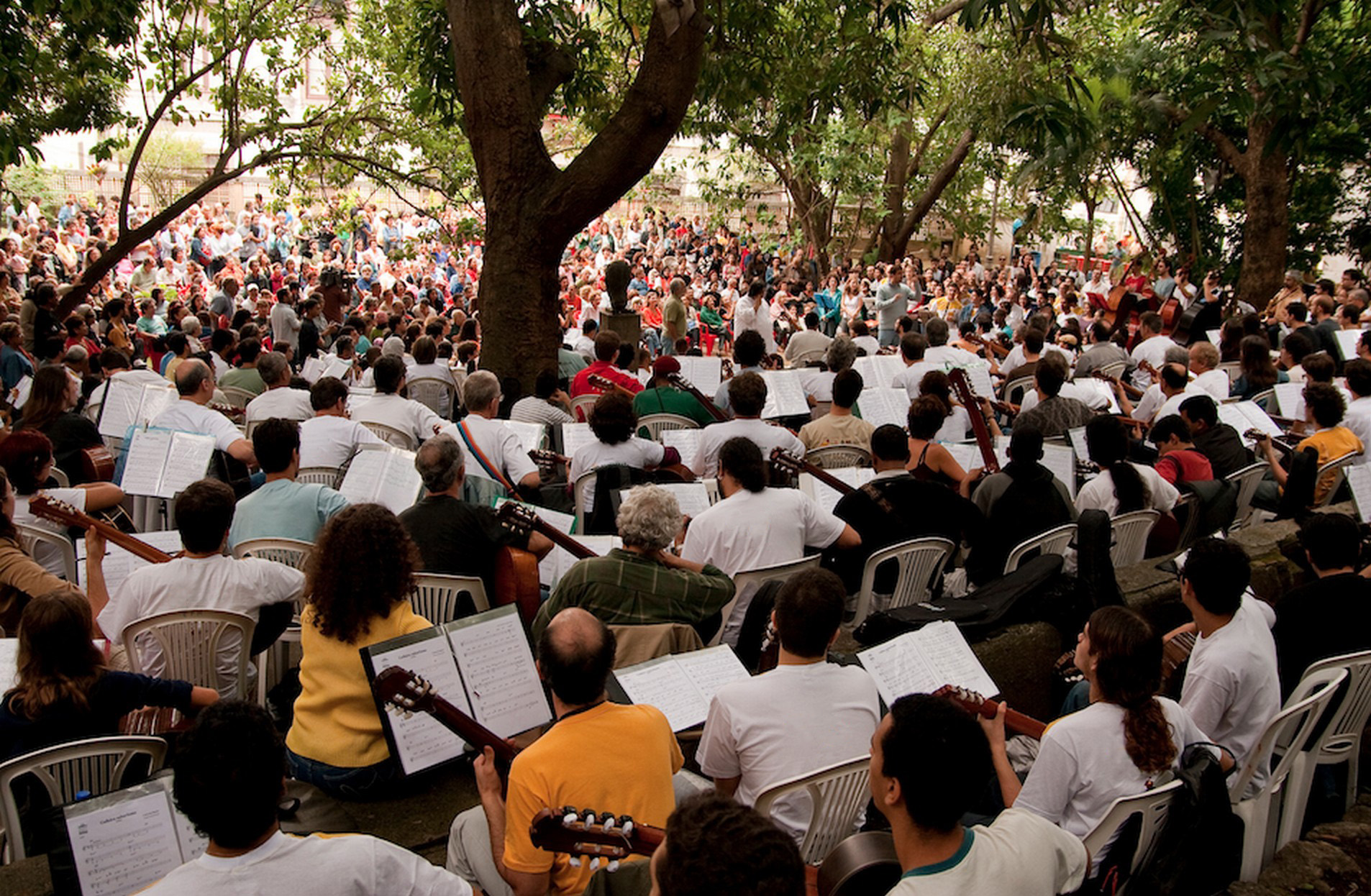
Inaugurated by passionate choro musicians in 2000, the Escola Portátil de Música emerged from an essential desire to preserve and impart profound understanding of this unique musical genre. Its humble beginnings were marked by a cohort of approximately 50 dedicated students at Sala Funarte. It has since burgeoned, now nurturing the talents of roughly 1,000 students across various platforms including the Urca Centers at UNIRIO, the immersive Virtual Center, and the culturally rich environment of Casa do Choro.
Inaugurated by passionate choro musicians in 2000, the Escola Portátil de Música emerged from an essential desire to preserve and impart profound understanding of this unique musical genre. Its humble beginnings were marked by a cohort of approximately 50 dedicated students at Sala Funarte. It has since burgeoned, now nurturing the talents of roughly 1,000 students across various platforms including the Urca Centers at UNIRIO, the immersive Virtual Center, and the culturally rich environment of Casa do Choro.
Currently, the institution prides itself on a faculty of approximately 40 esteemed educators. These instructors specialize in a broad spectrum of instruments, including flute, clarinet, saxophone, trumpet, trombone, double bass, guitar, cavaquinho, mandolin, pandeiro, percussion, piano, and vocal techniques. Notably, the majority of these educators have honed their skills at EPM, embodying the school's legacy. What sets EPM apart is its ensemble of teachers who are not just academicians but professional musicians, renowned and actively contributing to the contemporary music scene.
Beyond instrumental instruction, the curriculum is comprehensive, offering courses in music appreciation, the history of choro, samba accompaniment techniques, music theory, harmony, arrangement, composition, and ensemble practice, among others. This holistic musical education ensures that graduates are well-equipped to thrive artistically across diverse musical genres.
EPM's Virtual Center has been a pivotal expansion, enabling the school to transcend geographical barriers and welcome students from various states of Brazil and numerous countries globally. These include regions as diverse as Europe, the United States, Latin America, Australia, and Japan, with a noteworthy community of over 100 Japanese students engaging in classes online, facilitated by real-time translation.
Within Rio de Janeiro, the school has fostered a vibrant cultural nexus. Bandão's weekly open rehearsals amalgamate students of all skill levels and have organically evolved into a celebrated weekend tradition and an informal tourist magnet. Nestled at the base of Morro da Urca, this gathering attracts both the casually curious and dedicated aficionados, all eager to absorb the strains of bespoke arrangements, be they timeless Brazilian classics or innovative new compositions.
Over the past two decades, the school's steadfast commitment to promoting music education through the language of choro has culminated in the professional emergence of dozens of young musicians on the national stage. Simultaneously, it has enriched the cultural landscape with thousands of amateur enthusiasts, who, through their performances, amplify awareness and appreciation, thereby cultivating new audiences for choro and Brazilian music in general.

Inaugurated by passionate choro musicians in 2000, the Escola Portátil de Música emerged from an essential desire to preserve and impart profound understanding of this unique musical genre. Its humble beginnings were marked by a cohort of approximately 50 dedicated students at Sala Funarte. It has since burgeoned, now nurturing the talents of roughly 1,000 students across various platforms including the Urca Centers at UNIRIO, the immersive Virtual Center, and the culturally rich environment of Casa do Choro.
Inaugurated by passionate choro musicians in 2000, the Escola Portátil de Música emerged from an essential desire to preserve and impart profound understanding of this unique musical genre. Its humble beginnings were marked by a cohort of approximately 50 dedicated students at Sala Funarte. It has since burgeoned, now nurturing the talents of roughly 1,000 students across various platforms including the Urca Centers at UNIRIO, the immersive Virtual Center, and the culturally rich environment of Casa do Choro.
Currently, the institution prides itself on a faculty of approximately 40 esteemed educators. These instructors specialize in a broad spectrum of instruments, including flute, clarinet, saxophone, trumpet, trombone, double bass, guitar, cavaquinho, mandolin, pandeiro, percussion, piano, and vocal techniques. Notably, the majority of these educators have honed their skills at EPM, embodying the school's legacy. What sets EPM apart is its ensemble of teachers who are not just academicians but professional musicians, renowned and actively contributing to the contemporary music scene.
Beyond instrumental instruction, the curriculum is comprehensive, offering courses in music appreciation, the history of choro, samba accompaniment techniques, music theory, harmony, arrangement, composition, and ensemble practice, among others. This holistic musical education ensures that graduates are well-equipped to thrive artistically across diverse musical genres.
EPM's Virtual Center has been a pivotal expansion, enabling the school to transcend geographical barriers and welcome students from various states of Brazil and numerous countries globally. These include regions as diverse as Europe, the United States, Latin America, Australia, and Japan, with a noteworthy community of over 100 Japanese students engaging in classes online, facilitated by real-time translation.
Within Rio de Janeiro, the school has fostered a vibrant cultural nexus. Bandão's weekly open rehearsals amalgamate students of all skill levels and have organically evolved into a celebrated weekend tradition and an informal tourist magnet. Nestled at the base of Morro da Urca, this gathering attracts both the casually curious and dedicated aficionados, all eager to absorb the strains of bespoke arrangements, be they timeless Brazilian classics or innovative new compositions.
Over the past two decades, the school's steadfast commitment to promoting music education through the language of choro has culminated in the professional emergence of dozens of young musicians on the national stage. Simultaneously, it has enriched the cultural landscape with thousands of amateur enthusiasts, who, through their performances, amplify awareness and appreciation, thereby cultivating new audiences for choro and Brazilian music in general.